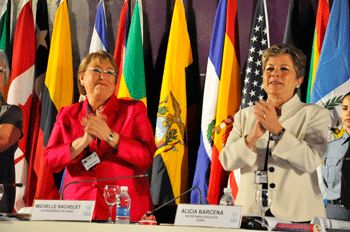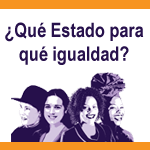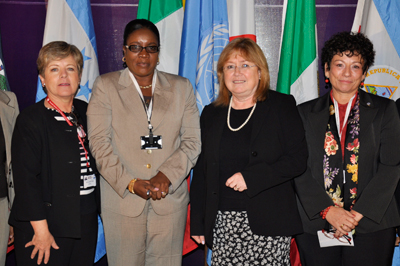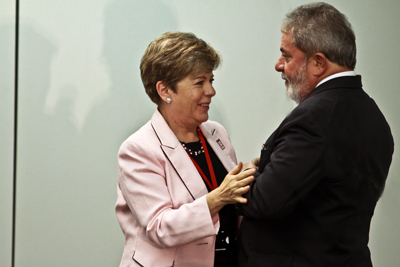Gender Equality Is the Road to Freedom and Democracy
Work area(s)
Authorities and delegates from over 30 Latin American and Caribbean countries debate the challenges that need to be overcome in order for women to achieve full autonomy.

Watch live transmission of the Conference
(13 July 2010) Over 800 delegates from more than 30 countries in the region, including Government authorities and civil society representatives, participated in the first day of the Eleventh session of the Regional Conference on Women in Latin America and the Caribbean, now being held in Brasilia.
The commitment of Governments to continue advancing along the road towards equal rights and opportunities for men and women was reaffirmed at the inauguration "as the only way to achieve true freedom and democracy in societies".
The Conference, which is organized by the Economic Commission for Latin America and the Caribbean (ECLAC) with the support of the Secretariat on Policies for Women of Brazil, was opened by Celso Amorim, the Minister of Foreign Affairs of Brazil, who welcomed the participants on behalf of President Luiz Inácio Lula da Silva.
"The equality issue is directly related to the gender issue," he stated.
"We therefore reaffirm our commitment to strengthening the role of women both in the national and the international realms. Gender parity is very important, and the gender perspective should be mainstreamed into all social indicators."
At the opening session, the Executive Secretary of ECLAC, Alicia Bárcena, presented the document What kind of State? What kind of equality?, which was prepared specifically for the Conference. The document examines the progress made by Governments in the region as regards gender equality as well as the challenges that lie ahead.
"At ECLAC, we want to emphasize the need for women's work to be validated once and for all in the economy," she announced.
The core objective is to raise the visibility of the unpaid work done by women and to ensure that it is fairly valued by the State and by the market. "The statistic silence that has surrounded unpaid work needs to be broken," she declared.
Ms. Bárcena reminded participants that the pursuit of equality has been an ongoing process, a road that has been built day by day, "from the right to vote to the right to autonomy over our bodies, from parity and quota laws to the renegotiation of care work."
In addition to listing the advances achieved with respect to gender equality since the Quito Consensus (adopted at the tenth session of the Regional Conference on Women, held in 2007) and the progress made in various countries in the region with regard to the legal recognition of the women's rights, the Executive Secretary stressed that achieving physical autonomy, economic autonomy and autonomy in decision-making for women is fundamental for consolidating efforts to achieve equality.
During the event, the United Nations Special Adviser on Gender Issues and Advancement of Women, Rachel Mayanja, stressed "the need to move from commitment to action, to close the gap between what should be -according to law and policy- and what is -the practice and realities of women's and girls' lives."
A "sense of urgency results from our acknowledgement that gender equality and women's empowerment are essential for the achievement of all internationally agreed development goals," she said.
The Minister on Policies for Women of Brazil, Nilcéa Freire, said that the region of Latin America and the Caribbean has played a pioneering role in social struggles and the development of human rights legislation. "Similar expectations surround the Brasilia Consensus, which we will adopt at this Conference", she said. The Minister emphasized the importance of non-governmental organizations (NGOs) and gave the floor to Nalva Brasão, a representative of Brazilian civil society.
Subsequently, the former President of Chile, Michelle Bachelet, gave a keynote address in which she highlighted that the State cannot be neutral: what is needed is a majority-backed political will to bring about change that translates into public policies that tackle the root causes of injustice.
"Only a solid democracy that is constantly improving can create the conditions needed to further the cause of gender equality and change the lives of millions of women in the region.
"We must reaffirm our commitment to democratic principles and procedures;" she warned. "We must not forget Latin America's traumatic experience with regimes that trampled on people's basic rights and scorned the sovereignty of the people."
See also:
- Speech by ECLAC Executive Secretary, Alicia Bárcena
- Presentation by Alicia Bárcena of the document What kind of State? What kind of equality? (in Spanish)
- Statement by the United Nations Special Adviser on Gender Issues and Advancement of Women, Rachel Mayanja
The document What kind of Sate? What kind of equality? is available on the website of the Eleventh session of the Regional Conference on Women in Latin America and the Caribbean.
Enquires and requests for interviews should be directed in Brazil to: Valderez Caetano, valderez.caetano@cdn.com.br ; tel: (61) 3704-7660, (61) 81177518; Talita Sitta, talita.sitta@cdn.com.br ; tel: (61) 91054870; or Cláudio Tourinho, tourinho@cdn.com.br ; tel: (61) 37047660, (61) 81177313, of CDN Comunicación Corporativa; or the Public Information and Web Services Section of ECLAC, e-mail: dpisantiago@cepal.org ; tel: (56 2) 210 2040/2149.
Related content

New Social Covenant Needed to Achieve Equality between Women and Men in the Workplace
Women in Latin America and the Caribbean must conquer economic, physical and political autonomy for full recognition of their rights.

Opening of the Eleventh Session of the Regional Conference on Women in Latin America and the Caribbean
By Alicia Bárcena, Executive Secretary of ECLAC

Women Must Be Placed at the Centre of Development for the Rebuilding of Haiti and Chile
Authorities and representatives of the United Nations discussed the challenges outstanding in this area at the Eleventh session of the Regional Conference on Women in Latin America and the Caribbean,…

"Women Are Better at Channelling the Benefits of Social Programmes"
The President of Brazil received delegates to the Eleventh session of the Regional Conference on Women in Latin America and the Caribbean in Brasilia.

Latin America and the Caribbean Countries Approve Action to Achieve Autonomy and Equality for Women
Support is also expressed for the creation of UN Women and the post-earthquake reconstruction efforts underway in Haiti and Chile.

¿Qué Estado para qué igualdad?
Presentación de Alicia Bárcena, Secretaria Ejecutiva de la CEPAL, en la Undécima Conferencia Regional sobre la Mujer de América Latina y el Caribe. Brasilia, Brasil, 13 de julio de 2010.
Country(ies)
- Latin America and the Caribbean
Contact
Public Information Unit
- prensa@cepal.org
- (56 2) 2210 2040
